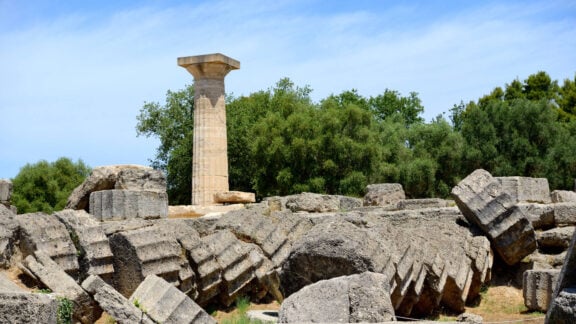As a kid, Claire Catacouzinos loved hearing stories about Greek Mythology from her papou and father.
Now, as the Children’s Magazine editor for The School Magazine in Sydney, she wants to share these stories and make them beloved experiences for other kids too.
“The great thing about being a child, or even just being a human being, is that sense of wonder and awe or amazement that you get from reading about magic, and mythology does that for you. It wakens up your imagination,” said Claire Catacouzinos to Neos Kosmos.

Her newest children’s short story, “Eione,” set at a Greek community picnic at Gunnamatta Bay, “celebrates family, Greek culture, Greek mythology, and one’s continuing connection to their family’s original homeland.”
It will be published in Orbit magazine (Issue 5), this June, in The School Magazine, which has been running in New South Wales since 1916.
“It’s about a young girl called Christina, who comes from a Greek Australian family. She attends community picnics with her family around Australia…and she just happened to come across – once her yiayia gives her a coin pendant necklace – a Nereid, which is a mermaid in Greek mythology,” said Catacouzinos.

Her grandparents come from a small town named Agiasos, located on the island of Lesbos, and were part of The Progressive Community of Agiasos in Sydney.
She said going to the Agiasos Community annual picnic with her family, along with childhood memories of “picnics, camps, and beaches with cousins,” inspired her to write this story.
“It’s a short story that celebrates family, Greek culture, Greek mythology, and one’s continuing connection to their family’s original homeland”
“When I was older, I started attending the Greek community picnics, and I found I was able to connect more with my grandparents… I think it’s also good to pass down those traditions to kids to also participate in community events like that, so they know where they come from and to keep their heritage alive.”

These stories are Catacouzinos’s way of sharing the migrant experience “beyond the home and into the Australian landscape” that they “navigated as a big family,” and help others connect to their cultural journey.
“It’s about coming back to heritage, knowing where you come from.”
Her upbringing was like that of many Greek Australian kids in Australia: lots of visits to “yiayia and papou’s house,” surrounded by uncles, aunts, and cousins all the time, going to christenings and social events regularly.

The Greek-Australian writer said she did not feel a strong divide between her two cultural identities, until she visited Greece for the first time in 2005.
That’s when she met her “whole mum’s side of the family,” in the Greek island of Lesvos.
While that allowed her to “immerse” herself into Greek culture, she also experienced what felt like an “emotional blow.”
“I realised that there was a language gap as well, because we weren’t as Greek as the Greeks are.”

Catacouzinos said she found it hard to connect with her Hellenic roots through language after only two years of Greek school, and tried to change that at university, where she “did ancient Greek,” and “a bit of modern Greek.”
“I’m still becoming fluent, still getting there, but for me language is a really deep personal thing that I’m still trying to explore and I still need to get educated on.”
“I have been constantly surrounded by my Greek identity and to me it was something that had always been evoked with a sense of pride from both sides of my grandparents.”

Growing up with stories from Greek mythology like “Hercules,” “Jason and the Argonauts,” or the “12 Olympian gods,” she said there’s “one great thing that’s still relevant about reading mythology.”
“One thing that’s universal about human beings is stories and storytelling.”
Catacouzinos said people who write literary fiction view stories connected to someone’s background differently nowadays.
“There’s a lot of nostalgia people going back, looking at the past and thinking, ‘you know what things were actually good. We appreciate where we’ve come from. We just want to, you know, celebrate that history and culture that was given to us from our parents.'”

While she has written a lot about Greek mythology and Ancient Greece in the past, “Eione” is Catacouzinos’s first contemporary Greek children’s short story.
Her journey as a writer began at the age of nine when she started “letter writing with her friend” after moving schools.
Then at 17, she wrote her first “20,000 words” novella for a competition and won.

After high school, she went to Macquarie University, where she got her Bachelor of Arts degree in ancient history, focusing on ancient Greece.
She then did a major in creative writing and followed it up with a two-year master’s degree in creative writing.
While studying at Macquarie, she started writing articles and stories for publications.

“That sparked a lot of joy for me, which has a lot to do with my Greek heritage and Greek background and what I love to read about and be surrounded by when I was a kid.”
In 2015, her poem ‘Mnemosyne’s Amaranthos’ won first place Greek Australian Cultural League of Melbourne poetry prize.
“It was about invoking the goddess of language and remembrance. And it was about me exploring how I felt culturally, growing up about wanting to learn, Greek, deeply exploring what my Greek identity means to me.”
Catacouzinos said that while she’s still learning, she hopes that “one day” she will be able to write more in Greek in her poetry or writing.







